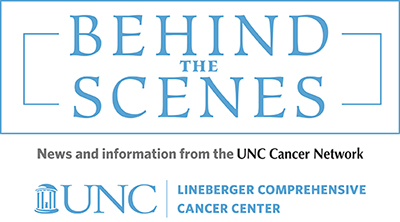Behind the Scenes — April 2019


From the Telehealth Director
Dear UNC Cancer Network Community Members,
Here at the UNC Cancer Network, we are very excited about a new way that members of our community can spread the word about our free continuing education lectures. We call the role the Program Promoter. This role was created with the recognition that there are many in our audience who have access to various mailing lists with members who may have an interest in our lectures.
Put simply, if you agree to become a program promoter, you are agreeing to accept two extra emails each month. Each email contains details about an upcoming lecture which may be forwarded to other health care professionals. It also contains a PDF of a flyer for the upcoming lecture, which may be printed, posted, and circulated as you see fit. Finally, we will include a PDF with details regarding the on-demand lectures in our Learning Portal.
You may find out more about becoming a Program Promoter at: http://www.unccn.org/promoter . If you would like to become a Program Promoter (or have questions), please contact us at unccn@unc.edu or call us at 919-445-1000.
Best wishes to all, Tim.
![]()

Tumor Molecular Analysis Can Help Improve Survival in Patients with Colorectal Cancer
by Federico Innocenti, MD, PhD
The molecular markers that are available to guide therapeutic decisions for patients with advanced-stage colorectal cancer are limited. However, a comprehensive mutational analysis of the DNA mutations in colorectal cancer samples now indicates that several genetic features provide prognostic information. They also can be used to direct the choice of the best treatments. This research has been led by UNC Lineberger’s Federico Innocenti, MD, PhD, Associate Professor in the UNC Eshelman School of Pharmacy Division of Pharmacotherapy and Experimental Therapeutics.
Next-generation sequencing of tumor DNA revealed genetic alterations that were linked to different survival and treatment outcomes. This analysis was performed on tumors patients with newly diagnosed, advanced-stage colorectal cancer collected before treatment in the CALGB/SWOG 80405 trial. Patients received chemotherapy plus bevacizumab and/or cetuximab, and the two treatments were equivalent in terms of survival benefit.
One key finding from the analysis was that patients who had a lot of genetic repeats in their tumor DNA – known as microsatellite instability – had longer survival when treated with bevacizumab compared to patients treated with cetuximab. “This finding has important potential implications for treatment of patients with microsatellite instability – a subgroup that represented about 7% of patients in our study,” Innocenti said.
Another important discovery was that patients with tumors that had more genetic variation, called high tumor mutational burden, lived longer than patients who had tumors with less variation. The level of tumor mutational burden defines a new subgroup of patients with better prognosis. Studies are ongoing in Innocenti’s lab to try to understand the role of the body’s immune system in contributing to these findings, such as to know if patients with higher tumor mutational burden could be more responsive to immunotherapy than patients with a lower tumor mutational burden. It is crucial to define which patients could be responsive to immunotherapy in this setting, and this study shows the first promising evidence to do so, Innocenti stated.
The study also confirmed that a mutated BRAF gene is a very strong negative prognostic factor, reducing the survival of patients with this mutation in their tumors. There was no difference in the study between the different treatment strategies studied in the trial for patients with or without the BRAF mutation. However, the finding confirms these tumors have a different biology and should be treated differently.
The findings, published in the Journal of Clinical Oncology, could help define strategies to more effectively treat colorectal cancer, the second leading cause of cancer death in the United States. Further research is ongoing to study additional ways of stratifying patients based on their genetic features to improve outcomes.
“This is an example of precision oncology, where genetics can be used to stratify tumor types that we once believed were homogenous, and to identify new patient subgroups that might benefit from more effective therapies,” said Innocenti.
In addition to Innocenti, other authors included Fang-Shu Ou, Xueping Qu, Donna Niedzwiecki, Rachel Tam, Shilpi Mahajan, Richard M. Goldberg, Monica M. Bertagnolli, Charles David Blanke, Hanna Sanoff, James Atkins, Blasé Polite, Alan P. Venook, Heinz-Josef Lenz and Omar Kabbarah.
The study was supported by the National Institutes of Health and Genentech.
Conflicts of Interest: None
References:
https://www.ncbi.nlm.nih.gov/pubmed/30865548
https://www.nature.com/articles/s41571-019-0206-4
![]()

Upcoming Live Events
Raj S. Pruthi, MD
Optimal Care for Bladder Cancer Patients: Current Obstacles and Opportunities for Cystectomy Patients
https://unclineberger.org/unclcn/professional-education/calendars/telehealth-lectures/”
The lecture will evaluate the recent improvements in patients undergoing radical cystectomy for bladder cancer (including peri-operative chemotherapy and robotic surgery) and will describe some of the obstacles to providing optimal care that still exist.
Marc Bjurlin, DO, MSc, FACOS
Meredith Crabtree, FNP-C
Prostate Cancer Screening
https://unclineberger.org/unclcn/professional-education/calendars/telehealth-lectures/”
The most common non-skin cancer among men in the U.S., prostate cancer can be difficult to catch early. With this lecture, we will talk about screening methods, such as MRI and MRI- ultrasound targeted fusion biopsy as a risk stratification tool for men at risk for prostate cancer. For men who undergo radiation treatment, we will also touch on which ones might consider utilizing hydrogel. We will also discuss the nurse’s role in prostate cancer screening and care.
![]()

Recent Additions to the Learning Portal
Dominika L. James, MD
Prevention of Chronic Post-Operative Pain in Cancer Patients
https://learn.unccn.org/online-course-catalog/rn-and-allied-health-courses/”
The talk discusses perioperative pain management techniques that can be utilized to decrease post-operative pain as well as development of chronic postoperative pain among cancer patients.
Brandi Reeves, MD
Matthew Foster, MD
Best of ASH 2018: Myeloma and Leukemia/MDS
https://learn.unccn.org/online-course-catalog/medical-and-surgical-oncology-courses/”
Each year, the American Society of Hematology (ASH) hosts a conference highlighting some of the latest hematologic oncology research. Join us as our speakers discuss some of the top presentations on Myeloma and Leukemia/MDS from this year’s ASH conference.
![]()
Learn more about the continuing education and other outreach efforts of the UNC Cancer Network. Many of the outreach programs that are part of the UNC Cancer Network are funded through the University Cancer Research Fund. Find out what UNCCN is doing by following us on Twitter at @unc_cn, join us on Facebook at www.facebook.com/unccn, unccn.org, or email us at unccn@unc.edu
We have signed you up for our newsletter with the hope that you will find value in its content. If this was forwarded to you by a colleague or friend, and you want to be added to our distribution list, please send us an email at unccnoperations@unc.edu.
Editor: Mary King, meking@email.unc.edu
Contributors: Dr. Thomas C. Shea; Tim Poe, Telehealth Director: Jon Powell, PhD, Continuing Education Specialist: and Veneranda Obure, AV Support Engineer.
Copyright © 2019 UNC School of Medicine Office of Information Systems, All rights reserved.